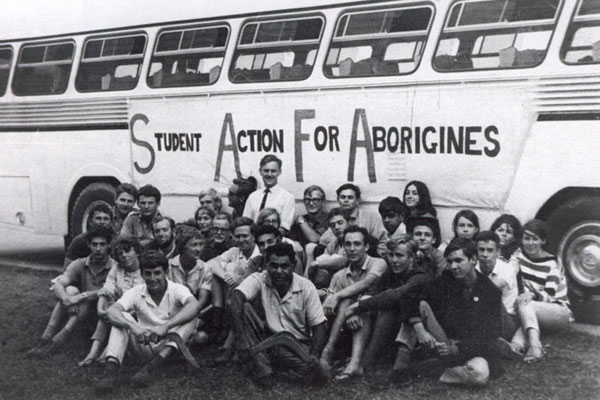The 1965 Freedom Rides was a bus tour of students from the University of Sydney led by Dr Charles Perkins. It was undertaken to bring attention to the racism, poor education, poor health and lack of decent housing in country towns with substantial Aboriginal populations north of Sydney.
Moree recently celebrated 50 years since the Freedom Rides, but there is very little to celebrate when Moree is still one of the most disadvantaged towns in Australia, this despite it being one of the richest agricultural shires in the nation.
The seasonal work that Moree’s Aboriginal population once depended on for employment has all but dried up, with the advancement of machinery and backpackers taking the crumbs of available work.
In the mid-1980s Moree was the richest shire in Australia, but to look at the town of Moree today, you wouldn’t know that. It’s now a town of low employment, closed shop fronts and social dysfunction at its core.
Drug and alcohol problems, a symptom of low socio-economic areas, run rampant. Crime, another symptom of the poverty inherent in Moree, is inordinately high for a town that boasts only 10,500 people.
When the Freedom Rides came to Moree in 1965, Aboriginal people were not allowed in the spa baths that mark its most popular tourist attraction. When the students who made up the Freedom Ride Movement decided to address this issue by taking Aboriginal children to the spa baths, an angry crowd of local white townspeople spat at and hurled racist abuse at them in front of the swimming complex.

The Freedom Riders were invited to a meeting with local council and a decision was made that the then council would change its by-laws, which stated that Aboriginal people were not allowed at the baths.
When the Freedom Riders left, the by-law was changed back.
Aboriginal people weren’t legally allowed to enter the pools until the late 70’s. Currently, the entry fee into the spa baths is so exorbitant, a great number of Aboriginal families simply cannot afford it.
There are no local council run community employment driven programs for the disenfranchised Aboriginal people of Moree, and it shows. For a town that has one of the highest percentage of Aboriginal people in New South Wales outside of a metropolitan area, the unemployment rate of 58% is catastrophic.
The average weekly income is $316, further fuelling poverty and all the problems that come with low socio-economic households.
In 1965, Aboriginals had a different ward in the hospital from white people. Today 5 per cent of Moree’s Aboriginal population lives with a severe disability, and the health of the Aboriginal population is equal to that of the rest of Australia’s First People – on a par with third world countries.
Other than an increase in the birth rate, there have been no other major breakthroughs in the area of health since statistics and records began to be kept.
Education results in Moree have seen no significant change since the Freedom Rides of 1965, with only 14 per cent of Aboriginal students graduating from year 12. This despite many different non-consultative programs and directives for decades. Lack of engagement and blanket ‘solutions’ across many different communities repeated ad nauseum.
73 per cent of Aboriginal people in Moree live in rented housing, the majority of which is government owned, and in various states of disrepair in badly neglected neighbourhoods. That’s about equal to the statistics which greeted Dr Perkins in 1965.
The fact is, current of racism that ran through the town in 1965 still exists today. Only it now exists in an underground, more subtle way through non employment of Aboriginal people, uncomfortable feelings in certain shops, extreme racial profiling by police and law enforcement officers and white flight from certain areas.
To celebrate 50 years since the Freedom Rides seems like a token gesture once the conditions in Moree from 1965 are weighed against the reality of life in Moree for many Aboriginal people today.
The poverty, racism, ill health and poor education system still exist today.
Donate To New Matilda
New Matilda is a small, independent media outlet. We survive through reader contributions, and never losing a lawsuit. If you got something from this article, giving something back helps us to continue speaking truth to power. Every little bit counts.



